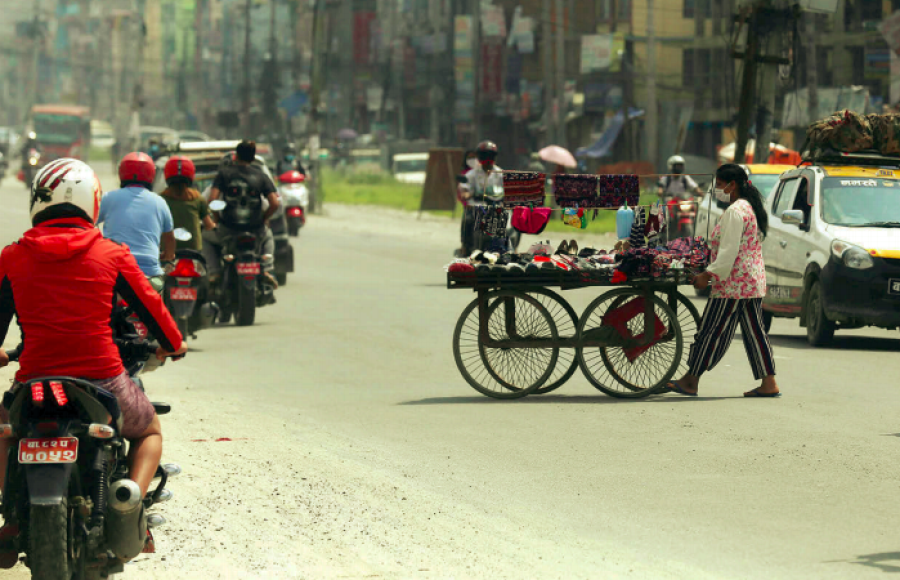Valley
Kathmandu wants local administration to roll back decision to allow footpath vending
Friday's incident shows absence of coordination between federal and local governments in controlling Covid-19 as cases spiral in the city.
Anup Ojha
Kathmandu municipal authorities are in conflict with the district administration over the permission granted to footpath and pushcart vendors to do their business as part of the new relaxation in Covid-19 restrictions.
The chief district offices of Kathmandu Valley on Wednesday evening decided to continue prohibitory orders for another week, while relaxing some measures including resumption of vehicular movements on odd-even registration basis.
The authorities also fixed timings for opening shops and delivering services. According to the official order, footpath shops, pushcarts, stationery stores, department stores and electronic shops can open till 11 in the morning and 4 to 7 in the evening.
Two days later, the Kathmandu Metropolitan City registered its concern about the local administration’s decision. Deputy Mayor of Kathmandu Metropolitan City Hari Prabha Khadgi on Friday reached Chief District Officer Janakraj Dahal’s office leading a delegation of ward representatives to seek a review of the decision.
The city, in its annual plans and policies, has decided to clear footpaths by removing street vendors and pushcarts, said Khadgi. “The CDO’s announcement is against the city's rules.”
“The number of Covid-19 cases is going uncontrollably high. In this situation if we let footpath vendors run their business, contact tracing will be more difficult,” she said.
According to the municipal Public Health Division, Kathmandu has carried out contact tracing of 10,275 people. The division’s data shows a total of 4,512 people were infected with Covid-19 including 31 deaths as of Thursday.
Responding to the city’s concerns, Dahal said the decision was aimed at addressing the problem of working class people. “We are concerned now. We will take further decisions in consultation with the district crisis management committee for Covid-19,” said Dahal.
Friday's incident shows how the federal and local governments have failed to hold adequate consultations for devising measures to control the contagion as coronavirus cases spiral in the city.
Street vendors, meanwhile, have voiced concerns against the city’s move for banning their business in such a difficult time.
“We are the ones most affected by the Covid-19 lockdown. Many of us are facing hard times surviving here. Now the city has again asked the CDO to close our business,” said Kumar Sapkota, chairperson of the Nepal Street Vendors Trade Union.
The union’s data shows there are more than 10,000 street vendors around the Valley. Before the three weeks of restrictions and four months of nationwide lockdown starting March 24, many vendors would do their business after 7pm on the footpaths of Ratnapark, Sundhara, Kalanki, New Baneshwor, Koteshwor, New Bus Park, Chabahil, and Gaushala, among other places.
“Now the biggest festivals of Dashain and Tihar are near and we hoped to earn a little, but the authority does not listen to poor people like us,” said Sapkota, who used to run a footpath shop at Ratnapark.
The street vendors’ problem is not new. The Kathmandu metropolis has failed to manage street vendors for over two decades now. A decade ago, a committee formed by the government recommended relocating vendors to Khulamanch, Tinkune Ground, Kalanki and Balaju, but that didn’t happen. In 2014, then home minister Bam Dev Gautam had ordered evicting all vendors from the streets of Kathmandu but the vendors defied it. Even during the local level elections of 2017, Mayor Bidya Sundar Shakya had listed the management of street vendors among his priorities but in three years since, there has been no significant change.
Dhanapati Sapkota, chief of the city police, says Covid-19 has put everyone in trouble. “They [street vendors] are illegal, and they should be stopped,” he said. “Our task is to implement the city's rule, and we will follow its decisions.”
Meanwhile, Gyan Bahadur Oli, Covid-19 focal person at the city’s health division, says letting street vendors do their business will increase the risk of Covid-19 transmission. He argued that crowding makes it impossible to implement the basic health protocol.




 22.12°C Kathmandu
22.12°C Kathmandu.jpg)












